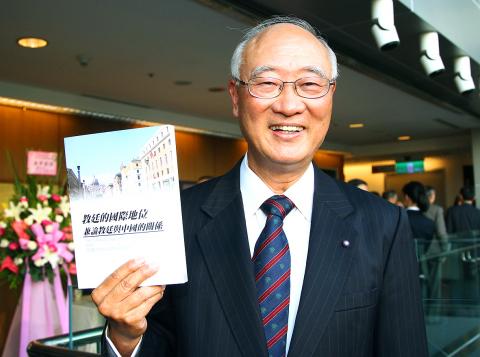The Vatican has long hoped to establish diplomatic relations with China, but that “could still be a long way off,” because dialogue between the two sides — let alone negotiations — has yet to develop, former ambassador to the Holy See Tou Chou-seng (杜筑生) said yesterday.
Having served as the nation’s ambassador to the Vatican, the only European state to maintain diplomatic ties with Taiwan, between 2003 and 2008, Tou recently published a book The International Status of the Holy See and its Relations with China (教廷的國際地位兼論教廷與中國的關係).
At a book launch, Tou spoke about the evolution of the Vatican’s China policy and possible future of relations between the Holy See, Taiwan and China, questions he said he was often asked about.

Photo: CNA
The incident last month, in which China stripped Ma Daqin (馬達欽), the auxiliary bishop of Shanghai, of his title has brought relations between China and the Vatican to a new low, Tou said.
Ma’s ordination, with the approval of China and the Vatican, had been seen as a hopeful sign that both sides could live with the disagreement over the appointment of Chinese bishops, but that hope was dashed after Ma was placed under house arrest for publicly renouncing the Chinese Catholic Patriotic Association (CCPA), Tou said.
The CCPA is China’s state-run organization that controls the state-backed Catholic Church and officially represents Chinese Catholics.
China runs the country’s Catholic church independently of the Vatican, and if the situation remains unchanged, its aim of establishing ties with the papal state is “a quixotic goal,” he said.
The Vatican has long held a “one China” policy, except during a period when Pope Paul VI served as pope and advocated a “two China” policy in 1964 that would see the UN recognize the People’s Republic of China without dropping the Republic of China, Tou said.
When former president Chen Shui-bian (陳水扁) was re-elected in 2004, he had wished that the nation’s diplomatic allies could add “Taiwan” to the names of their embassy in Taipei, Tou said.
“Although the Holy See did not oppose the idea, it has never changed the name of its embassy in Taipei. It is still called the ‘Apostolic Nunciature in China,’ while Holy See secretariat of state has addressed the nation’s embassy in Vatican as the ‘Embassy of China to the Holy See’ in correspondence,” Tou said.
Tou said that he had, on various occasions, inquired with the Vatican about the possibility of it switching recognition from Taipei to Beijing, following hints by Vatican officials.
“The answer I received was always the same: That could only happen when most people in China enjoy freedom of religious beliefs,” he said.
That does not mean that the Vatican would never establish diplomatic ties with China, but the time has not yet come, he said.
In his book, Tou said that the Vatican has repeatedly promised Taiwan that the Chinese Regional Bishops’ Conference, informally known as the Bishops’ Conference of Taiwan, and the nation’s embassy in the Vatican will be informed of any major decision it makes on cross-strait relations.
It will not make a decision that would catch Taiwan unprepared, he said.

A preclearance service to facilitate entry for people traveling to select airports in Japan would be available from Thursday next week to Feb. 25 at Taiwan Taoyuan International Airport, Taoyuan International Airport Corp (TIAC) said on Tuesday. The service was first made available to Taiwanese travelers throughout the winter vacation of 2024 and during the Lunar New Year holiday. In addition to flights to the Japanese cities of Hakodate, Asahikawa, Akita, Sendai, Niigata, Okayama, Takamatsu, Kumamoto and Kagoshima, the service would be available to travelers to Kobe and Oita. The service can be accessed by passengers of 15 flight routes operated by

Alain Robert, known as the "French Spider-Man," praised Alex Honnold as exceptionally well-prepared after the US climber completed a free solo ascent of Taipei 101 yesterday. Robert said Honnold's ascent of the 508m-tall skyscraper in just more than one-and-a-half hours without using safety ropes or equipment was a remarkable achievement. "This is my life," he said in an interview conducted in French, adding that he liked the feeling of being "on the edge of danger." The 63-year-old Frenchman climbed Taipei 101 using ropes in December 2004, taking about four hours to reach the top. On a one-to-10 scale of difficulty, Robert said Taipei 101

Taiwanese and US defense groups are collaborating to introduce deployable, semi-autonomous manufacturing systems for drones and components in a boost to the nation’s supply chain resilience. Taiwan’s G-Tech Optroelectronics Corp subsidiary GTOC and the US’ Aerkomm Inc on Friday announced an agreement with fellow US-based Firestorm Lab to adopt the latter’s xCell, a technology featuring 3D printers fitted in 6.1m container units. The systems enable aerial platforms and parts to be produced in high volumes from dispersed nodes capable of rapid redeployment, to minimize the risk of enemy strikes and to meet field requirements, they said. Firestorm chief technology officer Ian Muceus said

MORE FALL: An investigation into one of Xi’s key cronies, part of a broader ‘anti-corruption’ drive, indicates that he might have a deep distrust in the military, an expert said China’s latest military purge underscores systemic risks in its shift from collective leadership to sole rule under Chinese President Xi Jinping (習近平), and could disrupt its chain of command and military capabilities, a national security official said yesterday. If decisionmaking within the Chinese Communist Party has become “irrational” under one-man rule, the Taiwan Strait and the regional situation must be approached with extreme caution, given unforeseen risks, they added. The anonymous official made the remarks as China’s Central Military Commission Vice Chairman Zhang Youxia (張又俠) and Joint Staff Department Chief of Staff Liu Zhenli (劉振立) were reportedly being investigated for suspected “serious